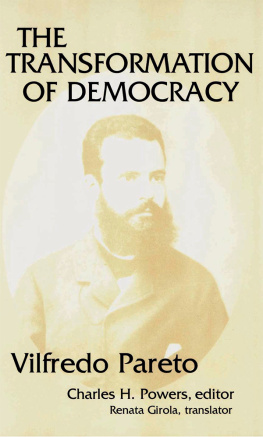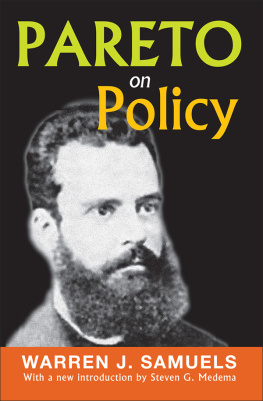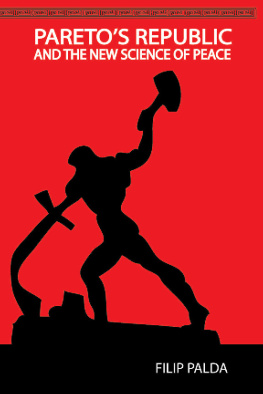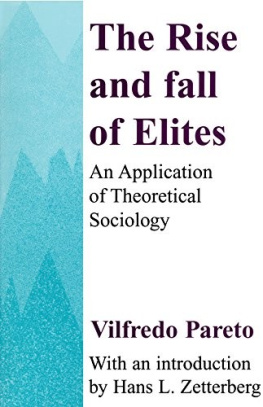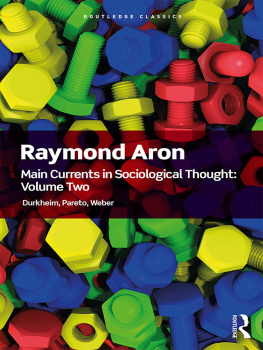The
Transformation
of Democracy
The
Transformation
of Democracy
Vilfredo Pareto
Charles H. Powers, editor
Renata Girola, translator
First published 1984 by Transaction Publishers
Published 2017 by Routledge
2 Park Square, Milton Park, Abingdon, Oxon OX14 4RN
711 Third Avenue, New York, NY 10017, USA
Routledge is an imprint of the Taylor & Francis Group, an informa business
Copyright 1984 by Taylor & Francis.
All rights reserved. No part of this book may be reprinted or reproduced or utilised in any form or by any electronic, mechanical, or other means, now known or hereafter invented, including photocopying and recording, or in any information storage or retrieval system, without permission in writing from the publishers.
Notice:
Product or corporate names may be trademarks or registered trademarks, and are used only for identification and explanation without intent to infringe.
Library of Congress Catalog Number: 83-18089
Library of Congress Cataloging-in-Publication Data
Pareto, Vilfredo, 1848-1923.
The tranformation of democracy
(Social science classics series)
Translation of: Trasformazione della democrazia.
Includes bibliographical references and index.
1. Democracy. I. Powers, Charles H. II. Title.
JC423P25313 1984 321.8
ISBN 0-87855-949-3 (pbk.) 83-18089
CIP
ISBN 13: 978-0-87855-949-7 (pbk)
To Jonathan Turner
social physicist
Table of Contents
Charles H. Powers
Charles H. Powers
Social Science Classics
The American Presidency, Laski
Critiques of Research in the Social Sciences, Blumer
Cultural Sciences, Znaniecki
Earth-Hunger and Other Essays, Summer
The Engineers and the Price System, Veblen
An Essay on the History of Civil Society, Ferguson
General Economic History, Weber
The Growth of the Mind, Koffka
Guild Socialism Restated, Cole
Human Nature and the Social Order, Cooley
Human Nature in Politics, Wallas
Jews and Modern Capitalism, Sombart
Myth of the Nation and Vision of Revolution, Talmon
News and the Human Interest Story, Hughes
Outlines of Sociology, Gumplowicz
A Preface to Morals, Lippmann
Progressive Democracy, Croly
The Psychology of Marxian Socialism, de Man
The Psychology of Socialism, Le Bon
Recollections, de Tocqueville
The Rise & Fall of Elites, Pareto
Social and Cultural Dynamics, Sorokin
Social Organization, Cooley
The Social Role of the Man of Knowledge, Znaniecki
Society in America, Martineau
The Sociological Eye, Hughes
The Theory of Business Enterprise, Veblen
Toward a General Theory of Action, Parsons and Shils
The Theory of Economic Development, Schumpeter
The Transformation of Democracy, Pareto
Young Germany, Laqueur
Developing an accurate translation of any work poses monumental problems. The difficulties are clear when one thinks of poetry. A literal translation loses its meaning and eloquence. Consequently, translators must also become editors if the spirit and meaning of translated works are to be retained. Yet, one always feels compelled to stay as close as possible to the exact literal translation, making only those editorial changes necessary to enhance readability and accurate conveyance of ideas. We have made every effort to provide just such a translation, changing as little as possible but editing where necessary in order to enhance understanding.
There is every reason to believe that Pareto would have encouraged the development of an easily readable translation true to the spirit of the original work. Indeed, the work Pareto himself prepared for publication in English is lucid and almost eloquent by comparison with most of his works translated into English by others. It therefore seems unlikely that he would have approved of stilted semantics and confusing terminology which sacrifice meaning at the expense of literal exactness. We follow Paretos example in presenting The Transformation of Democracy in the style we believe he would have preferred.
Two types of editorial change were frequently made. First, many long sentences were broken up into shorter sentences in order to correspond with conventional English usage. Second, nouns were often inserted in the place of Paretos pronouns in order to enhance clarity.
A number of other editorial changes, less systematic in nature, have also been made. In every case, the object has been to enhance readability and full conveyance of the meaning and spirit of Paretos monograph. It is our belief that this carefully edited translation will be more accurate and more useful than a strictly literal translation.
Unless otherwise indicated, all footnotes are from the original text. Parentheses are used where Pareto himself used parentheses. Brackets are used in order to distinguish between material Pareto was quoting and the editorial quips Pareto inserted when he was quoting others, as well as to distinguish any material added to Paretos text by the editor.
Our first acknowledgment goes to Jonathan Turner, who provided Charles Powers with the initial encouragement to read Paretos works in 1977. It was under his tutelage that Powers clarified and systematized Paretos insights. Moreover, it was during this period that preparing an English translation of The Transformation of Democracy became one of Powerss intellectual goals. Further intellectual stimulation and encouragement have come from Randall Collins, John Stanley, Reza Maghroori, and Allen Grimshaw.
The quality of the translation that follows is due to collaborative effort. However, Girola bore primary responsibility for the initial translation, while Powers bore primary responsibility for editing. We were provided with some additional translating assistance by Ms. Shellie Tellier.
Editorial assistance was provided by Joan Takahashi Powers, John Stanley, Dalia Buzin, and Irving Louis Horowitz. Helpful comments were provided by Whitney Pope, Juergen Backhaus, and Thomas Gieryn. Peter Burke, Gregory Travis, and Robert Elwood have been helpful in facilitating preparation of the manuscript. Norma MacKay and Jordan Henderson also assisted. Text editing facilities were provided by the Institute of Social Research, Indiana University, under the direction of James Lincoln at the time this project was initiated, and subsequently under the direction of David Knoke.
Charles H. Powers
Renata Girola
Introduction:
The Life and Times of Vilfredo Pareto
Charles H. Powers
Economists, political scientists, and sociologists have been highly selective in their reading of Pareto. Lacking familiarity with the breadth of his work, they often seem oblivious to the real issues Pareto was trying to address at different stages of his career or to the overarching theory he was systematically constructing. This introduction focuses on Paretos intellectual maturation and identifies his overall theory of society.

